

Διαχειρίζοντας την πρόσληψη σιδήρου του μωρού σου. Το να φροντίζεις τις διατροφικές ανάγκες των μωρών από μόνο του μπορεί να είναι μία αρκετά μεγάλη πρόκληση, πάνω στην οποία έρχεται να προστεθεί και η αντιμετώπιση της ανεπάρκειας σιδήρου και της αναιμίας σε κάθε γεύμα.

Όμως, αυτό που διακυβεύεται είναι μεγάλο. Οι διατροφικές ελλείψεις στη βρεφική ηλικία είναι δυνατό να επηρεάσουν τη σωματική και πνευματική ανάπτυξη του παιδιού. Επίσης, ενδεχομένως να υπάρξουν προβλήματα και μακροπρόθεσμα. Ό,τι τρώνε τα μωρά παίζει σημαντικό ρόλο στη σωματική τους ανάπτυξη, στην ανάπτυξη του εγκεφάλου και του ανοσοποιητικού τους συστήματος. Είναι πολλά λοιπόν που πρέπει να έχουν κατά νου οι μαμάδες! Ένας βασικός κανόνας για τη σχεδίαση των γευμάτων του μωρού σου, είναι να φροντίζεις τα φαγητά του να είναι πλούσια σε περιεκτικότητα σιδήρου.
Όπως βλέπεις, υπάρχουν πολλά που μπορείς να κάνεις για να διασφαλίσεις ότι το μωρό σου λαμβάνει τον σίδηρο που χρειάζεται για να έχει καλή υγεία και τώρα και στο μέλλον. Περισσότερα. How Much Sleep Do Babies Need? Time for Toddler Activities? No doubt about it, toddlers are physically and mentally active (there’s pretty much no stopping them in either department).
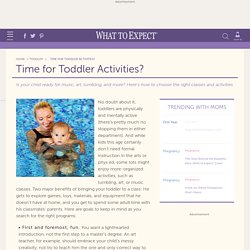
And while kids this age certainly don’t need formal instruction in the arts or phys ed, some tots might enjoy more-organized activities, such as tumbling, art, or music classes. Το φαρμακείο των διακοπών - babyspace. Εκτός από τις βαλίτσες, ετοιμάζουμε και το φαρμακείο της οικογένειας για ξέγνοιαστες διακοπές!
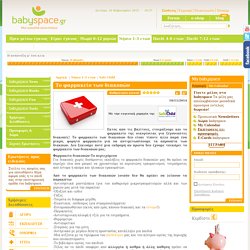
Το φαρμακείο των διακοπών δεν είναι τίποτε άλλο παρά ένα μικρό, φορητό φαρμακείο για να αντιμετωπίσουμε τα απρόοπτα των διακπών. Πώς φτιάχνουμε νόστιμες σούπες - babyspace. Πλούσια σε θρεπτικά συστατικά, γευστική, δυναμωτική, η σούπα ξετρελαίνει τα πιτσιρίκια.
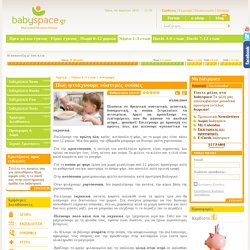
Αρκεί να προσέξουμε τις λεπτομέρειες που θα κάνουν το παιδικό γεύμα... gourmet! Επιλέγουμε με προσοχή τις πρώτες ύλες και πλένουμε σχολαστικά τα λαχανικά. -Επιλέγουμε την πρώτη ύλη: κρέας, κοτόπουλο ή ψάρι, αν το μωρό μας είναι πάνω από 12 μηνών. Πώς μεγαλώνει το παιδί τον 9ο μήνα - babyspace. Τον 9ο μήνα της ζωής η ανάπτυξη του παιδιού αφορά στην λεπτομέρεια.
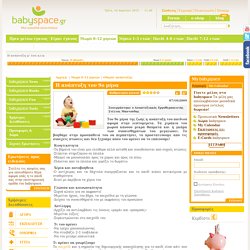
Τα χεράκια του μωρού κάνουν μικρά θαύματα και η γκάμα των συναισθημάτων του μεγαλώνει. Το βοηθάμε στην προσπάθειά του να περπατήσει, το προστατεύουμε από τις συνεχείς πτώσεις και δεν ξεχνάμε πόσο του αρέσει να το επαινούμε! Get Your Baby to Sleep Anywhere. Busy moms have places to go and people to see, so you don’t want to be tethered to home just because your little one will snooze only in her crib.

The next time you’re booking a room in some faraway place or just going across town to see your mom, try these strategies to get your baby to sleep: Practice makes perfect. Don’t wait until toddlerhood before you attempt to get your baby to sleep away from home. Stash a portable crib at Grandma’s and make some trial runs right from the start (or almost). Consistency counts. The "Yay!" Factor: Why Praising Your Baby Is Important. How praising your infant boosts her self-esteem and development.

You probably do it dozens of times a day: Give your baby a cheer, a round of applause, or a "You did it! " after she successfully reaches a toy or claps her hands. And while it may seem a bit much to be bursting your buttons with pride over such small accomplishments, it's not. Her new tricks are new to you, even if babies have been performing them since the dawn of time. Baby's First Toys. When it comes to choosing toys for your little one, the best choices stimulate the senses and help build basic skills.
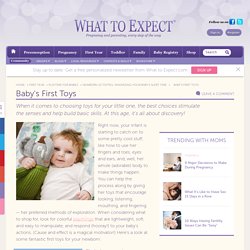
At this age, it's all about discovery! Right now, your infant is starting to catch on to some pretty cool stuff, like how to use her fingers and toes, eyes and ears, and, well, her whole (adorable) body to make things happen. You can help the process along by giving her toys that encourage looking, listening, mouthing, and fingering — her preferred methods of exploration. When considering what to shop for, look for colorful playthings that are lightweight, soft, and easy to manipulate, and respond (hooray!) Baby Teeth and Dental Health. What To Expect. After months of reclining and tummy time, your baby might be ready for a change of scenery.

Starting in month 3 or 4 (or whenever he holds his head up well and seems interested and ready), propping your baby up to sit with support will give him an amazing new vantage point on the world around him. The more practice your little one gets holding himself upright with support in an assisted seated position, the sooner he'll discover the pleasures of independent sitting — including a better vantage point on all his favorite toys (and his favorite people). Looking for more fun firsts? Visit our Milestones Center! Refusing to Self-Feed. What To Expect.
Πώς μεγαλώνει το παιδί τον 8ο μήνα - babyspace. Ο 8ος μήνας θέλει προσοχή, αφού το παιδί αρχίζει να πειραματίζεται όλο και πιο εντατικά με τον κόσμο γύρω του.

Βεβαιωνόμαστε ότι ο χώρος δράσης του είναι απόλυτα ασφαλής και δεν σταματάμε να του παρέχουμε ερεθίσματα. Ο χορός και το τραγούδι θα το συναρπάσουν! Κινητικότητα -Στέκεται όρθιο, υποβασταζόμενο -Οι πράξεις του έχουν πιο σαφή σκοπό -Σκύβει μπροστά για να πιάσει κάτι -Προσπαθεί να πιάσει το κουτάλι -Μπορεί να μπουσουλάει προς τα μπρος και προς τα πίσω Χέρια και αυτοβοήθεια-Πιάνει αντικείμενα μόνο με την παλάμη χωρίς τη συνεργασία αντίχειρα και λοιπών δακτύλων -Βάζει τα μικρότερα αντικείμενα μέσα στα μεγαλύτερα -Προσπαθεί να φάει μόνο του Γλώσσα και κοινωνικότητα-Ξεκινά να ανταποκρίνεται όταν ακούει τους γονείς -Κινεί τη γλώσσα του για να αλλάξει τον ήχο Αντίληψη -Ξεκινάει η μίμηση -Κάνει χρήση συγκεκριμένων δράσεων για να αντιμετωπίσει νέες καταστάσεις -Αναγνωρίζει το όνομά του όταν το καλούν. Φαγητό με το κουτάλι! - babyspace. Μια από τις πρώτες συνήθειες των μεγάλων που υιοθετεί το μωρό, είναι να τρώει από το κουτάλι. Ας δούμε πώς θα το βοηθήσουμε να μάθει τον χειρισμό του κουταλιού.
Μετά...ώρα για υγιεινή διατροφή! Ποιές τροφές προτιμάμε για τα πολύτιμα συστατικά που περιέχουν και για την πολύτιμη συμβολή τους στην ανάπτυξη του παιδιού. Πώς μαθαίνουμε το παιδί να χρησιμοποιεί το κουτάλι -Βάζουμε το κουτάλι ανάμεσα στα χείλη του παιδιού. Άρνηση φαγητού - babyspace. Το παιδί που τρώει μικρές ποσότητες φαγητού, με όλα τα απαραίτητα θρεπτικά συστατικά, πολλές φορές την ημέρα, καλύπτει τις διατροφικές του ανάγκες.
Κάποια μωρά βέβαια είναι δύσκολα με το φαγητό τους. Ας μάθουμε σωστούς τρόπους αντιμετώπισης της κρίσης! Υπέροχοι τρόποι για να διασκεδάσετε το μωράκι σας. Baby-Led Weaning 101. How to Make Baby Food. 7 Month Old Baby: Baby Routines: The Love of Repetition. Get ready to hit the rewind button, Mom. Here's what your seven-month-old is up to these days. You know that song your 7-month-old baby seems to love? Hope you like it too, because you'll likely be called upon to sing it about a thousand times — and when you're done, your seven-month-old will be begging for an encore. Babies (and toddlers and preschoolers too) love predictability. What To Expect.
Once your baby has started to practice her pincer grasp — otherwise known as the ability to bring her thumb and fingers together in a coordinated pinch — it's time to bring on the finger foods. Self-feeding is a big milestone in your baby's development, as it encourages her to explore food through her sense of touch as well as her senses of taste, sight and smell. (That's right: Just when you thought mealtime couldn't get any more messy...) Giving her lots of practice with smaller, bite-sized morsels of food helps her to master important finger skills, and it also helps her figure out how to gum, chew and move food around in her mouth — all crucial skills for a developing eater.
Looking for more fun firsts? Visit our Milestones Center! Is Your Baby Grasping the Pincer Grasp? Time for your baby to master yet another new feat: the pincer grasp. Here's how to encourage this important object-grabbing skill. By six months or so, your baby can likely pick up a tiny object, such as a coveted Cheerio, by raking it toward her with her hand, covering it with her palm, and squeezing it into her fist. Over the next few months, she'll learn a more direct route: the pincer grasp. Although it sounds like something a lobster might do with his claw, it simply means the ability to grab a small object with the thumb and forefinger.
And this growing dexterity means much more than efficient Cheerio retrieval. Treating Baby's Cold. Why babies are extra vulnerable to the common cold, and what you can do about it. There's a reason colds are called "common": Most healthy children have six to nine viral infections each year. Small children have more than their share of run-ins with runny noses because they haven't yet had the chance to build up immunities against the many different cold viruses flying around.
Though these frequent colds are rough on your baby's nose (and his snot-smeared cheeks), they won't do him any harm, and they can actually do him some good. Milk Allergy in Infants. Many a new mom dealing with a fussy newborn (and truthfully, what newborn isn’t fussy?) , has suspected that her suffering sweetheart must have a cows’ milk allergy or intolerance, especially when well-intentioned friends and relatives are also blaming milk.
If you’re breastfeeding, you may assume it’s the dairy in your diet that’s causing your little one to wail; if you’re formula feeding, you assume it’s the cow’s milk in the infant formula that’s causing the trouble. The problem with these hypotheses: A milk allergy in infants is much less common than most people think (it affects only an estimated two to three percent of babies), and milk intolerance is even more rare. Babyproofing Your Child's Play Area. Not Sitting Up Yet. Learning and Play: Developing Baby Skills. Πώς βοηθάμε το παιδί να μιλήσει - babyspace. Μια σειρά από απλούς αλλά αποτελεσματικούς τρόπους που μπορούμε να εφαρμόσουμε ώστε να βοηθήσουμε το παιδί μας στην ανάπτυξη της ομιλίας του, ανάλογα με την ηλικία στην οποία βρίσκεται. Το τρίπτυχο της επιτυχίας συνοψίζεται στα εξής: ενθάρρυνση, επανάληψη, υπομονή.
Στον πρώτο χρόνο -Ξεκινάμε να μιλάμε στο παιδί από την πρώτη στιγμή της γέννησής του. -Κάνουμε συνεχώς αστείες γκριμάτσες για να του κινήσουμε περισσότερο το ενδιαφέρον. -Ο ρυθμός ομιλίας μας πρέπει να είναι αργός ώστε το παιδί να ακούει και να μαθαίνει τις πρώτες του λέξεις. Ύπνος και Παιδί - babyspace. Πολλοί ειδικοί συμβουλεύουν να ακολουθούμε κάθε βράδυ μια συγκεκριμένη επαναλαμβανόμενη ιεροτελεστία ρουτίνας πριν βάλουμε το μωρό για ύπνο ξεκινώντας από την ηλικία των 3 μηνών.
Η επανάληψη καθησυχάζει τα μωρά (αλλά και αργότερα τα νήπια) ενώ το γεγονός πως ξέρουν τι θα ακολουθήσει τους δημιουργεί αίσθημα ασφάλειας που εξασφαλίζει ήσυχο ύπνο σε όλη την οικογένεια. Η ανάπτυξη τον 7ο μήνα - babyspace. Ο 7ος μήνας ξεκινά με μια τεράστια κατάκτηση: το παιδί μπορεί να καθίσει χωρίς τη δική μας υποστήριξη ή βοήθεια. Seven Ways to Raise a Compassionate Child.
When your tot’s a toddler, it’s easy to fear that she may turn out to be a tyrant. Hitting, biting, screaming, grabbing toys away from pals: It’s all typical toddler behavior. And it’s developmentally appropriate too. But that doesn’t mean you have to wait until your child’s outgrown this stage to start teaching her about empathy and compassion. If you want to raise a compassionate child, now’s the time to lay the foundation. Your Baby's Window on the World: Boosting Sensory Development. Long before TV and the Internet, the best screen to watch with a baby was the one attached to your window — and it still is! Think about it: The whole world is brand-spanking new to your infant, so everything outside that window will be fresh and exciting. Here's how to take a look at your surroundings through your baby's eyes and boost his sensory development: As you look outside together, tell your baby about what he's seeing — green leaves on the trees, a loud truck driving by, your neighbor sweeping his walk.
Building Baby Motor Skills. As your baby grows, he needs lots of opportunities to help his muscles do the same (no dumbbells required). You can foster large- and small-motor development with the simplest toys and equipment (or even none at all). Large motor skills (also called gross motor skills) will give your baby the strength and coordination he needs to progress from sitting to crawling to walking to running to all manner of physical activities and sports. To build those bitsy biceps, triceps, and more, mix things up often, moving your child from crib to floor to seat or from tummy to back and vice versa.
Different positions stimulate different muscles and encourage different motions (like push-ups from his tummy or leaning forward to reach a toy when he's seated upright). You can show him what to do by moving his arms and legs yourself — say, pulling him up into a sitting position or lifting his belly into a crawling posture. When Babies Don't Crawl. Our baby sits by himself but doesn’t crawl — is this normal? Unlike sitting up, crawling is not a must-do milestone. Lots of babies opt not to crawl at all — skipping straight to standing, cruising, and walking. Not only is that normal — it’s a growing trend among tots who don’t spend a lot of time on their tummies. Angry Baby. 6 Month Old Baby: Six Month Milestones.
When Babies Roll Over at Night. Teaching Baby Discipline. Why Children Love Water Play. Getting Baby to Fall Asleep in the Crib. Seven Ways to Encourage Your Baby to Play Solo. Mommy's Calling: Building Baby's Sense of Sound. Rejecting Baby Cereal. What To Expect. Germs and Babies. Germs and Babies. 7 Surprising Facts About Your Baby's Skin. 6 Steps to a Healthier Home for Baby. Tickle Time: Exploring Baby's Sense of Touch. How Much Sleep Do Babies Need? Πώς μεγαλώνει το παιδί τον 5ο μήνα - babyspace. Baby Development at 4-6 Months. What To Expect. Protecting Kids From Extreme Cold. Making the Most of Baby Time. Babyproofing Your Child's Play Area. Starting Solids. Seven Ways to Raise a Compassionate Child. When Your Baby Fusses in Baby Carriers, Slings, and Car Seats. Chatting Up Baby: 5 Ways to Encourage Baby Talk. How Sleep Problems Develop. Choking on Solid Food. 4 - 6 Months Milestone Door Page. Baby Personality. Fun With the Five Senses: Activities for Infants.
Choosing and Using a Play Yard. Early Signs of Autism. Best First Foods to Feed Your Baby. Best Toys for Older Babies. Decoding Your Baby's Cries - All Six of 'em! The Oopsie! Game for Baby. Relief for a Baby Stuffy Nose. Crawling Safety. Treating Baby's Cold. Independent Play: Give Your Baby a Drawer to Explore. Sleep Training Strategies. Five Ways to Boost Tummy Time.
Thumb Sucking Baby. Spitting Up Baby. Your Newborn's Weight: What's Normal, What's Not. Tips and Tricks for Sick Mommies. 7 Week Old Baby: Super Baby Senses. When to Call the Doctor If Your Child Is Sick. Monkey See, Monkey Do: The Baby Imitation Game. Limiting Screen Time for Babies. Crying It Out.
6 Diaper-Changing Games. Surprising Facts About Your Baby's Brain. Could it be Colic? The Rule of Three. 6 Week Old Baby: Learning to Grab. Teething Symptoms. Concerns About Vaccine Side Effects. Sofa Snoozing with Baby Is Dangerous [STUDY] 5 Week Old Baby: Baby Smiles, Sights, and Sounds. 2 Month Old Baby: First Smiles. Newborn Sleep Patterns: The Young and Restless. 3 Week Old Baby: Cracking the Crying Code. Signs of Colic. Baby's First Words. Chatting Up Baby: 5 Ways to Encourage Baby Talk.